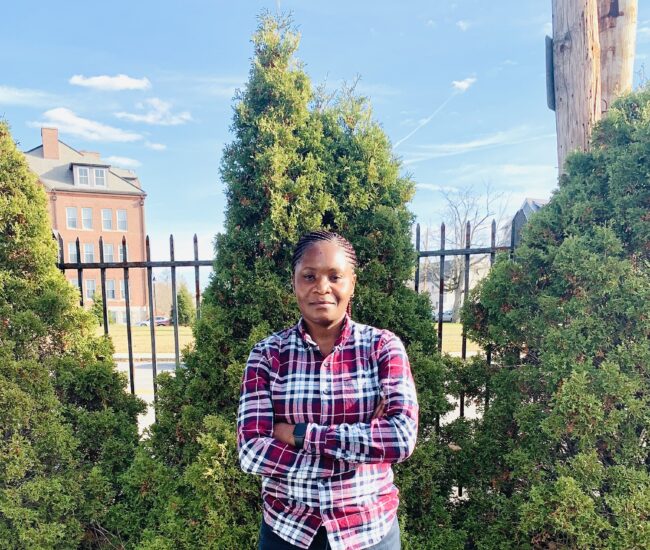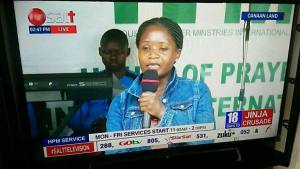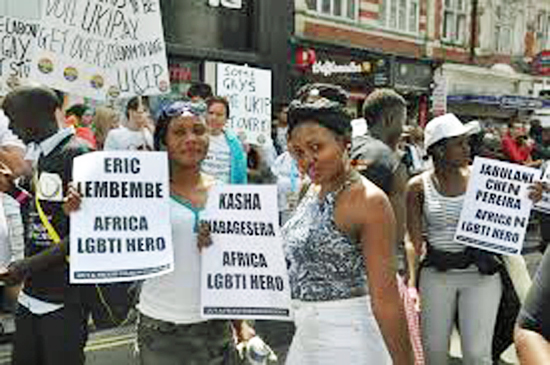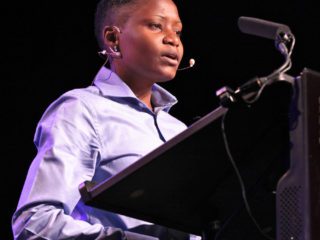Groundbreaking Ugandan LGBTQ activist Val Kalende explains how “gay conversion therapy” failed her and how she has sought to reconcile her Christian faith with her sexual orientation.

Val Kalende in December 2021. (Photo courtesy of Val Kalende)
Kalende has taken a break from activism, but she hopes to help others who are struggling with the question of how to be both faithful and LGBTQ.
“I don’t want another child to go through this alone,” she writes in the essay below. There she shares the complexity of being both lesbian and evangelical, as well as the Grace that helped her learn to embrace her lesbian identity. In the process, she says, she has realized that denying one’s sexual orientation is a form of self-harm. And she apologizes to anyone whom she hurt as she struggled.
Unchanged: A lesbian Christian’s journey through ‘ex-gay’ life
By Val Kalende
I was a founding member of Uganda’s LGBTQ movement. I became involved in organizing some of the groups which first led the struggle for LGBTQ rights in Uganda. Driven by passion and unrelenting courage my friends and I had this idea that we can create change in our community but also change the hearts of those who don’t understand us. I was honored to have shown up for the cause in its nascent stage. My public life was glorified in activism, but I had conflict with my faith and sexuality. I was on the frontline of a liberation struggle, but I needed self-liberation.
I grew up the daughter of a Pentecostal minister, and from an early age, I knew I didn’t need a lot of preaching to understand that the rules were written in stone. I stayed attached to the faith even when preachers said being gay and Christian is biblically untenable. They taught that the salvation package comes with self-denial. To deny myself would be to deny my love for women in the hope of an eternal crown of glory. I still attended Pentecostal churches even as I was a lesbian activist. Sometimes I was welcomed by a congregation. Sometimes the doors slammed in my face. I attended a liberal seminary, but I was immersed in academic research, I missed the opportunity for spiritual formation. I was a Pentecostal zealot with a rigidity that didn’t allow me to detach from a belief system that conflicted with my sexual orientation. I hoped there would be a way to belong to my faith tradition without having to crucify myself by way of heterosexuality.

Val Kalende during televised Prayer Crusade in 2018. (Photo courtesy of Jinja Crusade)
At the peak of my conflict, I finally gave in to “ex-gay” teachings. There was so much going on in my life at that time, I spiraled into depression. Here, in the middle of my most vulnerable moment, the preacher said gay people are not the will of God. It made sense, at that time, to believe God was mad at me. I blamed myself for being gay. I had just won asylum in Canada, and I was working two part-time jobs with Toronto-based nonprofits. But I didn’t see value in those things anymore. I wanted to stay alive, and I wanted to be home. I resigned, gave up my asylum, and returned to Uganda. If I had to “deny myself,” I had to be in an environment where I could wrestle with God and prove beyond reasonable doubt that I am exactly who I am meant to be.
The mind of the “ex-gay”
When I came out at age 20, it was unplanned. It shattered my life with rejection, but it was a blessing in disguise to live life on my own terms. As the years went by, I realized that coming out isn’t a one-time thing. Coming out was the blessing that made me a radical activist, but I stumbled in its unfinished work. I had come out to friends and family, and to activism, but I never fully came out to my spirituality. The doubt was never about knowing that I am a woman who is sexually and emotionally attracted to women. The doubt was whether my identity as a lesbian woman could co-exist with my identity as a Pentecostal Christian.
For LGBTQ people seeking to identify with evangelical Christianity, what they get from sitting in the pews is not more faith but more doubt. Did I really choose to be gay? Does God condemn me? Is there something more to live for? Am I enough? I believe these questions have crossed the mind of every gay person who has ever wanted to belong in the church. It’s the subconscious guilt of not being good enough because somewhere along the line parents, teachers, faith leaders have reprogrammed people to believe they “chose” Gay over God. Some LGBTQ people abandon religion while others opt for gay conversion therapy in churches and “ex-gay” organizations where “change” is promised.
When people are not anchored, when they need hope, they turn to the church. Sadly, church turns out to be a place where they are told hope comes at a price. They would have to give up their homosexuality. The estrangement of spirituality from some LGBTQ communities (in many ways driven by religious homophobia) may contribute to feelings of loneliness and isolation among some individuals. On the other hand, some individuals in LGBTQ communities feel that our communities tend to be tribal — tribes where what unites us is more important than our differences. It’s not uncommon to find religion shaming, transphobia, or racism in LGBTQ communities where our primary goal should be to strengthen one another.
Every “ex-gay” person chronicles a moment when everything started to feel wrong, and they started to think of every reason to explain it except the obvious one: I am gay. They claim to have had a spiritual awakening from God calling them out of homosexuality because their minds have been reprogrammed to blame themselves for being gay. It is the message the church is sending out to gay people and the pitfall that makes them susceptible to believing a lie—that they “chose” being gay over God. With the passing of time, it finally dawns on them that the problem was never about being gay. Some other issues were going on. This explains why years after the “ex-gay” person has been in church, they realize that church may have brought them closer to God, but their sexual orientation didn’t change. With that awakening some end up having secret same-sex affairs or same-sexual desires while others completely abandon the “gay conversion” cult and testify that change is not possible.
My “ex-gay” experience
The day started as a normal Sunday church service for me. I had been a member of the church for months. The pastor called me out from the pews without prior notice and told me to address the congregation about my “ex-gay miracle”. I spoke with him regularly for support, prayer, and counseling. He didn’t talk to me about his intention to call me out and speak publicly to the congregation. It was the first omen. In the days that followed, social media made me a poster child of “ex-gay” sensationalism, including the claim that “gays were after my life.” Fearing to become a pawn, I turned down every interview request. A year passed before I agreed to sit with a friend on his talk show.

At London Pride 2015, Val Kalende was honored as an African LGBTI Hero for her work as one of the founding members of Sexual Minorities Uganda. (This photo, which does not show Kalende or the sign honoring her, is courtesy of Out and Proud Diamond Group)
I learned from our prayer meetings that in the work of conversion, you proclaim what has not happened as if it has already happened. I learned to say “I am no longer gay” because I had offered myself to self-denial. I did every ritual that was suggested —exorcisms, prayer, outdoor evangelism, fasting. The Pentecostal way of fasting sometimes involves going without food or fluids for 24 hours for several days. When pastors told me that my lesbianism would disappear by repenting the sins of my ancestors, I knew I had got myself into a dangerous web of conspiracy theory. Someone from my prayer group told me he had gone to the graveyard of his ancestors and prayed while stamping his feet on the graves as he commanded evil spirits to leave him alone. It wasn’t that I was intellectualizing things but there was something unsettling about what I was hearing. Nothing made sense about their explanations for same-sex attraction. There was so much authenticity to my lived experience as a lesbian woman, but “ex-gay” theology was teaching me to turn it all into a lie. It was the first time I saw the “ex-gay” life as self-harm. It was up to me to get out of it or spend the rest of my life condemning myself for something God will never take from me.
Some people may not understand what it means to be LGBTQ and a person of faith, but these conversations are important because many LGBTQ people are hurting. Their lives are stifled in toxic anti-gay religious traditions, and they don’t know how to break free. Some have made it out alive, others have ended their life by suicide. It doesn’t matter whether people go into conversion by choice or through coercion. The religious fundamentalist idea that homosexuality can be reversed does damage to the victims of gay conversion but also to the LGBTQ movement. The culture wars over gay conversion make it difficult to transform social attitudes especially in countries where LGBTQ lives are still criminalized.
Debunking “ex-gay” theology
The creation story (He created them male and female – Genesis 5:2) is often used by anti-gay Christians to argue against same-sex relationships. But grace is so ungendered that people’s obsession with gender norms fails to fit into the true meaning of the Gospel. (There is neither male nor female; for you are all one in Christ Jesus – Galatians 3:28). This scripture simply tells us that God’s standards are so high he doesn’t see people in categories of race, class, or gender. This is the Gospel queered; to embrace the Gospel as queerness is radical faith. We see this when Jesus heals people on the Sabbath. On several accounts Jesus performs miracles to the agitation of religious leaders who plot to kill him because he has done what is scripturally unlawful to do on the Sabbath. The Bible doesn’t say same-sex love is forbidden. But it has a lot to say about gang rape and violence (Judges 19:22-25); lust and idolatry (Romans 1:24-27); greed, arrogance, and not helping the poor (Ezekiel 16:49-50).

Val Kalende speaking for LGBT rights in 2012. (Photo courtesy of Go Magazine)
There’s a belief among “gay conversion” groups that people can be born gay because “we are all born sinners”. They treat same-sex attraction as an addiction one can live with but keep in check, like a sin one lives with for the rest of their life while begging God to forgive them every time they fall back. So, I asked my friend: If proclaiming yourself as “ex-gay” doesn’t make your same-sex attraction go away, then what are we in this for? His response was incoherent. He mumbled some scriptures about daily repentance. This was the first warning sign for me, and I knew immediately that something wasn’t right about what I had set my heart to believe. I then decided to have one-on-one co conversations with every “ex-gay” individual within my reach. Nearly everyone I spoke to said they still have same-sex attraction. Some said they live with same-sex attraction even if they are functionally married to someone of the opposite sex. Some have chosen a life of celibacy. Others said they used to identify as bisexual so marrying someone of the opposite sex was effortless. Sadly, this is what “gay conversion” groups promote as “change is possible.”
Unchanged and unchained
For people who were raised in religious homes, faith becomes an identity. The fear of going against that identity is painful, especially when you’re told you can’t love whom you love because your faith forbids it. For those of us who have left the “ex-gay” cult, we are not blaming faith traditions. We are simply acknowledging that changing sexual orientation is not possible and seeking to change it is self-harm.
When I publicly denounced homosexuality, I know my friends felt like I could have betrayed them, but I felt like my faith was being challenged. Sometimes we make the wrong turn to get to the right place. In the end, we become better people. I apologize to everyone who was hurt by my actions, especially to young LGBTQ Ugandans who cry and hurt because they are told their life is worthless. I hear you. What you feel inside is exactly who you were born to be. God loves You. You’re enough. I am praying to find ways I can be more useful to those who are struggling with this question of being a person of faith and LGBTQ. Because I don’t want another child to go through this struggle alone.
Val Kalende was a founding member of Uganda’s LGBTQ movement. She is a graduate of Episcopal Divinity School ,where she graduated with a Master of Theological Studies in 2012.
Related articles:
- Popular Ugandan LGBT activist says she’s no longer a lesbian (June 2015, 76crimes.com)
- Honors for African LGBTI heroes at London Pride (June 2015, 76crimes.com)
- ‘Ex-gay therapy’: What reputable experts have to say
COMMENTS